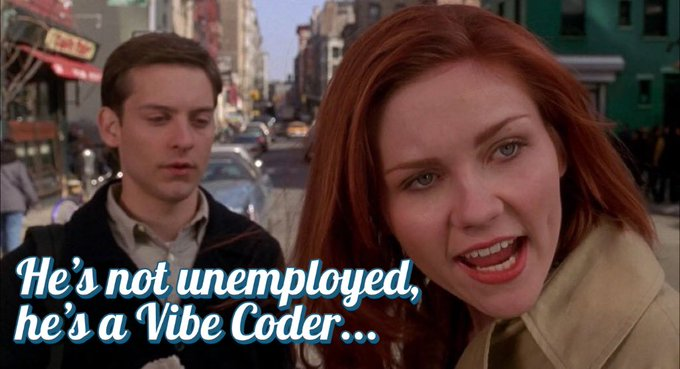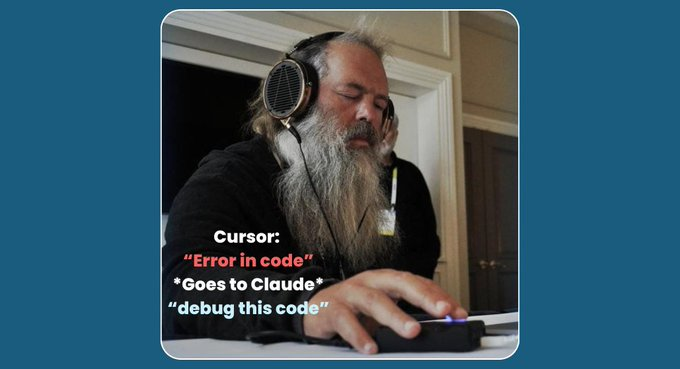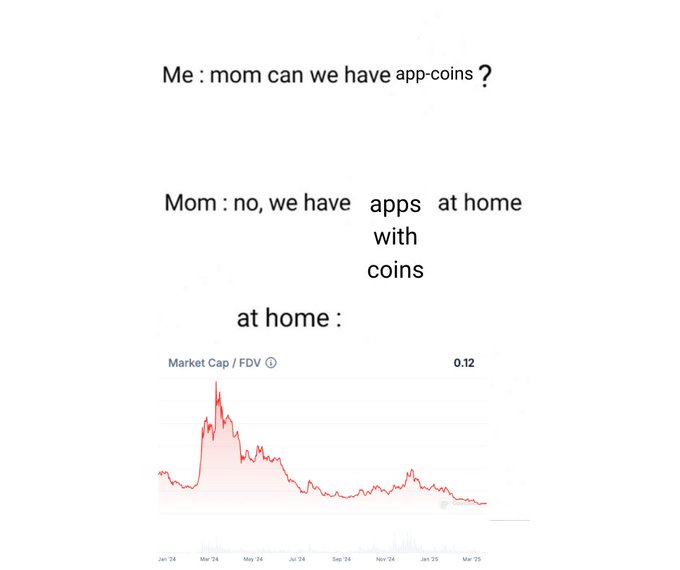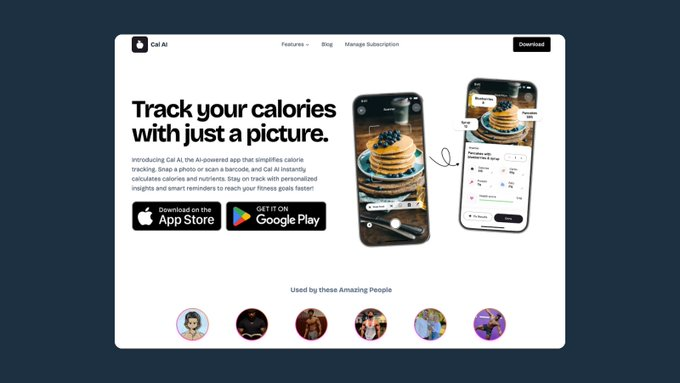Applied token theory in the Vibe Coding era: Why will it spawn a huge wave of wealth?

Reprinted from panewslab
04/09/2025·1MAuthor: Grant blocmates
Compiled: Tim, PANews
In the latest issue of Y Combinator startup, members were asked, "How many proportions in your code base are generated by AI?" One in four entrepreneurs said that 95% of their code is generated by AI.
For better or worse, Andrej Karpathy (former director of Tesla AI and founding member of OpenAI) created the term "Vibe Coding".
In short, this means that technical novices like you and me can also generate code by entering text (prompt words). Today, this has prompted many "imaginants" to postpone their job searches and instead try to create their next Facebook.

Extremely successful independent entrepreneur Pieter Levels recently showed how Cursor, Grok and Claude would probably come true in his almost entirely artificial intelligence-generated flight simulation game. Through inline ads, the game's current recurring revenue has reached $85,000 per month.
There are still many bugs in this mode, which require you to have a basic understanding of the actual situation to solve, especially when you are typing on the keyboard and trying to make it generate an application.
Naturally, some real developers emerged to provide consulting and debugging services to a new generation of pure AI programmers (yes, the front-end is done by Vibe Coding).

As these cutting-edge models continue to advance and perform better in generating code from natural language (text and speech), their output will become extremely efficient.
Anthropic CEO Dario Amodei recently said: In "three to six months", we will reach the stage of writing 90% of the code by AI. And in twelve months, AI will be able to "write almost all the code".
If this were the case, what would the world become?
Who will become the loser?
The cost of building an application is approaching zero. The SaaS subscription service you previously reluctant to pay can now be reproduced at a lower cost.
If a SaaS company does not build a solid enough moat through network effects, hard-to-replicate products, or strict legal intellectual property rights, it is done.
I'm talking about you, Docusign and Typeform.
In addition, building native products that can connect team workflows, knowledge bases and existing databases through MCP will be more efficient.
I think that people who are familiar with building AI may currently be one of the most urgent positions for small and medium-sized enterprises.
As some extremely powerful small models are launched one after another, companies will be able to run all processes internally through local machines or models, which will be of great benefit to privacy protection and operational security.
Teams that still regard "the smell of wine is not afraid of deep alleys" as an effective market strategy will eventually be eliminated by smarter teams. They just need to copy their products and then do better in marketing.
Who will be the winner?
With the development of code generation models, the competitive environment is becoming fairer from a technical perspective. Teams that can dominate the user’s mental share and attention struggle will stand out.
Excellent marketing comes from understanding your core audience, because you are the core audience yourself. If all products are similar, the app will become a fashion item that people use to show off.
"I use Claude because I know better than anyone else, so I won't use that famous ChatGPT, and this is for the novice who knows nothing."
To make an app famous, it has to be very cool. Brand shaping, market positioning and cultural sensitivity must be accurate and in place.
Guess what? In the near future, big language models will not be able to do this. Why? Because humans are far more complex than AI imagined.
Subculture is difficult to understand for those outside its closed circle. What is amazing in one person's eyes may be dull in another person's eyes.
We may see a world where everyone will unconsciously usher in a personalized user experience journey and exclusive user interface tailored to it based on their personal preferences.
The roles played by graphic designers, creative directors, marketing experts and UI/UX geniuses in an organization all require excellent taste and a vision to foresee trends.
These characters will perform well, and that will never change. The model cannot know what they don't know. In their most basic form, they are essentially word prediction machines.

Note: I am fully aware that the saying \"apply coins\" sounds stupid; irony is indeed impossible to convey in words.
Unless you have a wide network of contacts and have successfully invested in companies such as Anthropic, Cursor, OpenAI, and Perplexity, or have deployed potential stocks such as Lovable, Replit, and LindyAI in the application layer, you can only continue to have fun in your hardships.
If you are an addicted high-risk speculator and believe that encryption is the future of France, some of the teams I have recently spoken with are working on building such projects.
The idea is "apply coins". Such cryptocurrencies can be used as memecoin, both embodying and actually supporting founders or small teams that develop future applications.
Tokens are the best tool to solve cold starts, and the creativity stifled by cold start problems is far more creative than any other factor.
Founders and small teams who are difficult to attract the initial 10 to 100 users can effectively break through this dilemma through token mechanisms and speculative attributes.
It is undeniable that humans are born to be keen on speculation. But at the same time, they also desire to speculate on the premise of fairness. The idea of being able to discover the next creative young man that makes waves is of great significance in itself.

Have you seen this app? Cal AI can estimate calories by taking a picture of your food, with an error of less than 10%. It sounds like everyone's first entrepreneurial idea, right?
This is a team of four teenagers who use a product on the MyFitnessPal platform to create a business with an annual revenue of up to $20 million. How did it be done? Through precise market positioning, targeted customer groups are locked in to carry out targeted marketing.
They are vigorously investing their revenues in internet celebrity marketing every month (this method is very effective in the fitness industry) and positioning their products to the general user group: its product design is extremely simple, fresh, and fun at the same time.
They also made it clear that if you are training for Mr. Olympia, the product is not for you.
How many times has this product failed? If I were asked to guess, it would have to be hundreds of times.
What we'll see next are those apps that are launched at the same time as the tokens, for better or worse, which at least gives them some initial attention.
Will you be exploited? Sure.
Will some of them completely become "fog pieces"? Most likely, most of them are.
(Note: The word fog refers to the phenomenon that software or product is highly publicized before it is officially released, but it is delayed for a long time and even failed to be released in the end. It is often ironic that false propaganda or failure to fulfill its promises)
Will this happen anyway? Inevitably.
But what excites me is that the idea of code generation models and vibe coding (though the name has already made me a little embarrassed) can allow anyone to bring creativity to the market anywhere, anytime.
Introverts who don’t like carrots on their plates hitting peas, now they can bring their products to the market without eye contact or conversation with anyone. This model is worth looking forward to.
The team I'm observing:
- Kaito: In today's era, mental share and attention are the king, and even a novice can launch products.
- dev.fun: Solana-based Vibe coding platform, helps independent founders or small teams realize products from 0 to 1, and supports tokenizing creative ideas. Add points to buidl.
- Tryoharaa: Another platform that "turns ideas into projects with one click", based on Base chain development, UI/UX silky. The team is also hardcore, Brexton is a big shot.
- SendAI: Originally focused on the agent, it has now transformed into an application ecosystem platform that can be used by anyone.
- TaroBase: Quite low-key, but Alliance is said to be hatching them.
Here are a few examples that I think of temporarily, but I guess there will be some outstanding independent creators coming in the future, which will surprise us. I think we will also witness a single founder’s valuation of $1 billion in the next 12 months.
In short: With artificial intelligence, even if you don’t know programming, anyone can turn your creativity into actual products. The tokenization mechanism has spawned speculative behavior, which greatly increases the possibility of "developers" attracting users in the early stages. An explosive growth in application development is coming.
Finally, if this fantasy that broke out in my mind came true, we will witness the largest wealth creation ever. This will not only allow founders to accumulate unimaginable wealth, but will also provide ordinary investors with investment opportunities that will be ahead of everyone.
We have witnessed a huge demand for a level playing field and allow retail investors to be treated more fairly. Pumpfun was once a peer and reverse response to low circulation, high FDV scams, but it is still not an ideal solution for now.



 chaincatcher
chaincatcher